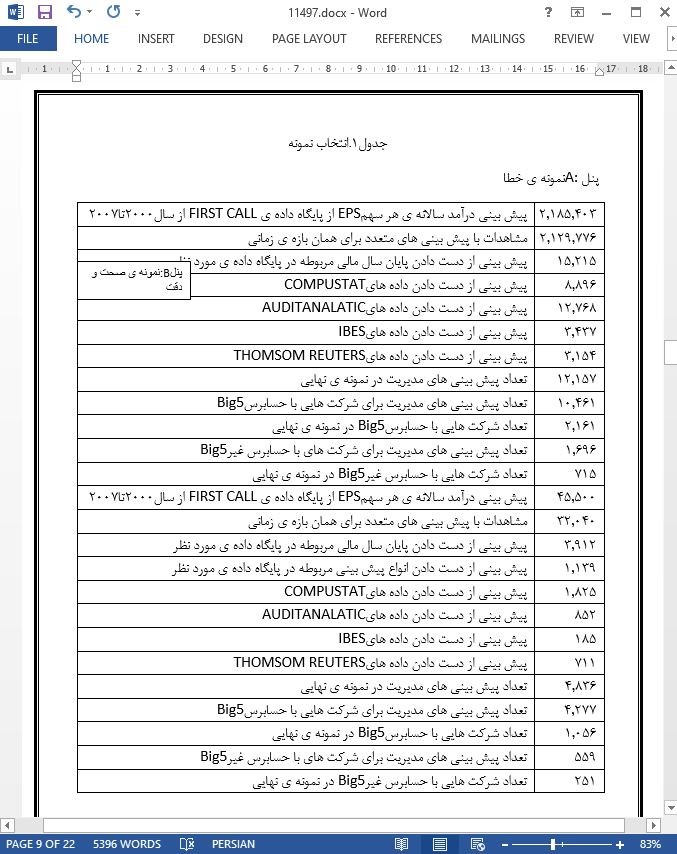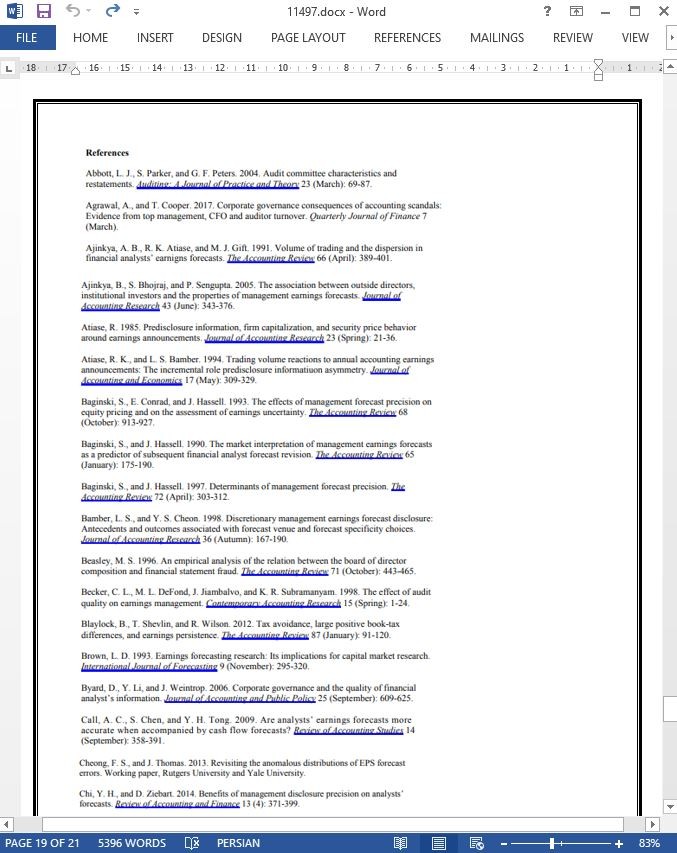
کیفیت حسابرسی و ویژگی های پیش بینی درآمد مدیریت
1.مقدمه
پژوهش قبلی رابطه ی بین ویژگی های حاکمیت شرکتی(سرپرستان بیرونی، کمیته های حسابرسی، هیئت مدیره) و کیفیت گزارش دهی مالی را مورد بررسی قرار داده است(کلتون2008 داویدسون2005 کلین2002 بیزلی1996). این مطالعات بیان می کنند که کیفیت گزارش دهی مالی را می توان از طریق مکانیزم های حاکمیت ساختار یافته بهبود بخشید. در این مطالعه، بررسی می کنیم که آیا کیفیت گزارش دهی به عنوان یکی از ویژگی های حاکمیت شرکتی مناسب، همراه با سایر ویژگی های حاکمیت شرکتی را می توان به افشای مالی و به انتخاب ویژگی های پیش بینی درآمد مدیریت، گسترش داد یا خیر. پالمروس در سال1988 و کریشنان در سال2000 توافق و اجماع کلی را بیان کردند که حسابرسی بیرونی یکی از عوامل کلیدی حاکمیت شرکتی را تشکیل می دهد.
ادبیات حسابداری شواهدی را بیان می کند که شرکت هایی با حسابرسی با کیفیت می توانند بر انتخاب و گزینه های پیش بینی شرکت تاثیر گذارند(کلارکسون2000داویدسون1993 فنگ2009 مک کونومی1998) و حاکمیت شرکتی را می توان به ویژگی های پیش بینی درآمد مدیریت مرتبط دانست(کارامانو2005). مطالعه ی ما علاوه بر دو معیار پرکاربرد حاکمیت شرکتی(نسبت سرپرستان بیرونی، نسبت مالکیت نهادی)، از کیفیت حسابرسی نیز استفاده می کند و با هزینه های اختصاصی و عوامل قانونی ترکیب می کند. مطالعه ی جامعی از این عوامل با استفاده از نمونه ی اخیر از مشاهدات انجام شده در مطالعات قبلی ارائه می دهیم.
5.نتیجه گیری
تمرکز این مطالعه بر بررسی رابطه ی بین کیفیت حسابرس و ویژگی های پیش بینی درآمد مدیریت است. با به کارگیری کنترل های اضافی(حاکمیت شرکتی، ریسک قانونی و هزینه های اختصاصی) و با در نظر گرفتن داده های اخیر با نمونه های بزر گتر، مطالعات قبلی در این زمینه را توسعه دادیم. دریافتیم که کیفیت بالای حسابرسی با خطای پیش بینی بزرگتر، احتمال ارائه ی پیش بینی های کاهشی و دقت و صحت کمتر در پیش بینی در ارتباط است. نتایج ما با این امر مطابقت دارند که حسابرسی با کیفیت، توانایی مدیریت برای اداره و مدیریت درآمد و اقدام استراتژیک مدیریت برای انتخاب صحت و دقت پیش بینی و سطح بهینه را محدود می کند. نتایج ما در مورد ورود متغیرهای کنترل و تاثیر گذار مطالعات قبلی بر خطای پیش بینی مدیریت و صحت و دقت پیش بینی، قاطع و مستحکم است.
I. Introduction
Prior research has examined the association between corporate governance (outside directors, audit committees, board of directors) attributes and financial reporting quality (Kelton and Yang 2008; Davidson et al. 2005; Abbott et al. 2004; Klein 2002; Beasley 1996). These studies suggest that financial reporting quality could be improved by well-structured governance mechanisms. In this study, we examine whether audit quality, as one attribute of good corporate governance, along with other attributes of corporate governance extends to financial disclosure and more precisely to the choice of management earnings forecast attributes.1 Palmrose (1988) and Krishnan and Schauer (2000) suggest a general consensus that the external audit constitutes a key of corporate governance.2
The extant accounting literature documents mixed evidence that higher-quality audit firms may influence the firm’s forecast choices (Clarkson 2000; Davidson and Neu 1993; Feng et al. 2009; McConomy 1998)3 and corporate governance may be associated with management earnings forecast attributes (Ajinkya et al. 2005; Karamanou and Vafeas 2005). Our study employs audit quality in addition to two widely used measures of corporate governance (the proportion of outside directors, the proportion of aggregate institutional ownership), combined with proprietary costs, and litigation factors (Ajinkya et al. 2005).4 We provide a comprehensive study of these factors using a somewhat a recent sample of observations than employed in the earlier studies.5
V. Conclusion
The focus of this study is to investigate the association between auditor quality and attributes of management earnings forecasts. We extend and refine prior studies of this relationship by employing additional controls (corporate governance, litigation risk, and proprietary cost) and by considering recent data with larger samples. We find that higher audit quality is associated with larger forecast errors, the likelihood of issuing downwardly biased forecasts, and less forecast precision.15 Our results and inferences are consistent with a high quality audit limiting management’s ability to manage earnings and management acting strategically in their choice of forecast precision, forecast error, and level of optimism. Our results appear to be conclusive and robust to the inclusion of control variables found in prior research to impact management earnings forecast errors and precision.
1. مقدمه
2. ادبیات قبلی و توسعه ی فرضیات
خطای پیش بینی مدیریت
اختلاف و انحراف (تعصب) پیش بینی مدیریت
دقت و صحت پیش بینی مدیریت
3. متدولوژی
انتخاب نمونه
تحلیل آماری
4. نتایج
تجزیه و تحلیل یکنواخت
تجزیه و تحلیل چند متغیره
نوع حسابرس و خطای پیش بینی مدیریت
نوع حسابرس و اختلاف پیش بینی مدیریت
5. نتیجه گیری
I. Introduction
II. Prior Literature and Hypothesis Development
Management Forecast Error
Management Forecast Bias
Management Forecast Precision
III. Methodology
Sample Selection
Dependent Variable – Management Forecast Error and Forecast Precision
Statistical Analysis
IV. Results
Univariate Analyses
Multivariate Analyses
Auditor Type and Management Forecast Error
Auditor Type and Management Forecast Bias
Auditor Type and Management Earnings Forecast Precision
V. Conclusion
- ترجمه فارسی مقاله با فرمت ورد (word) با قابلیت ویرایش، بدون آرم سایت ای ترجمه
- ترجمه فارسی مقاله با فرمت pdf، بدون آرم سایت ای ترجمه



